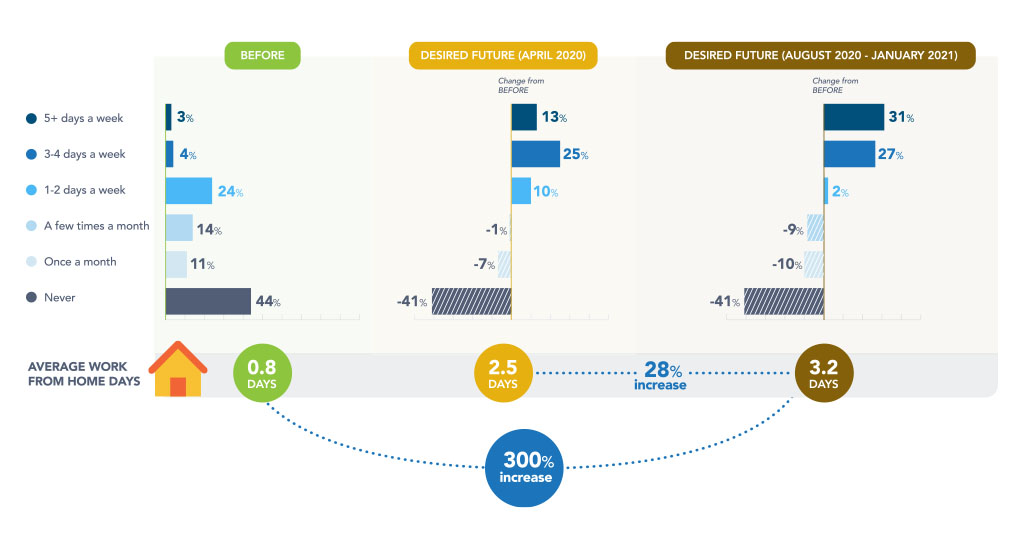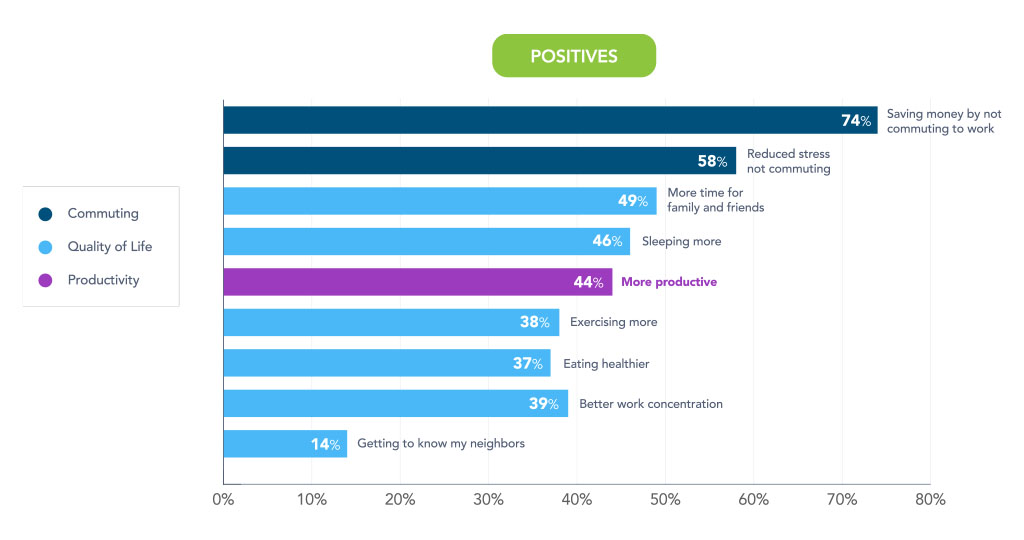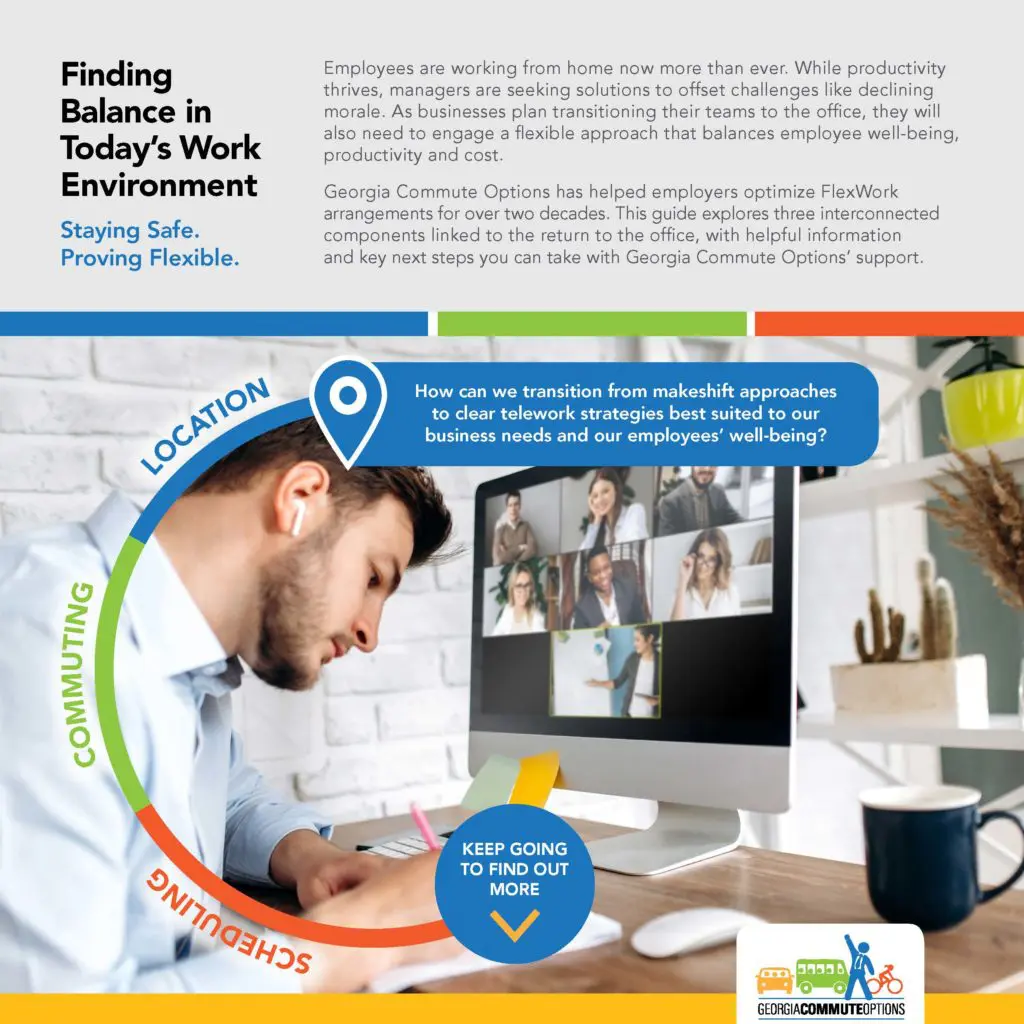In April 2020, the nature of work shifted drastically as many businesses in the Atlanta area transitioned their non-essential employees to remote work in response to the COVID-19 pandemic. Now, with vaccinations on the rise, companies are starting to think about what a future return to the workplace could look like.
A year of remote work has shown businesses that there’s a lot to consider before making that transition. The most significant takeaway: Employees can get a lot done outside of the office, even under the most extreme circumstances. Expectations around remote work and the nature of the office have been redefined. And just as there was a learning curve when first transitioning to remote work, there will also be one when working in the office becomes safe again in our community.
Over the past year[i], Georgia Commute Options surveyed nearly 3,000 members of the Atlanta region’s workforce to better understand employees’ perspectives on remote work. The survey asked respondents to share their experiences with remote work and their expectations going forward. The insights shared in this survey and accompanying discussion groups can guide employers with their plans for returning to the workplace.
What follows are some of the top takeaways this research revealed. Plus, we have included two free resources for you to use with your teams right now.
Employee Demand for a Hybrid Workweek Has Grown
The question that’s on almost everyone’s mind: Is remote work here to stay? The answer is a resounding “yes.”
Across the board, survey respondents showed strong support for having more remote workdays in the future. In April 2020, survey respondents indicated that they wanted at least 2.5 remote workdays per week once the pandemic was over. By August 2020, this demand increased to 3.2 remote workdays each week and has held steady ever since. In fact, many participants in the discussion groups stated that they would be disappointed or would consider leaving their employer if they weren’t offered remote work options in the future.

What’s behind this strong demand? It’s not just that people have become used to remote work. The data shows that there are real benefits to working from home.
The top two benefits are linked to the recouped time and money and reduced stress because they do not commute. Based on responses gathered over four survey periods, more than 70% of respondents said they were saving money by not commuting. Nearly 60% said the lack of a commute reduced their stress. The primary hesitations people had around returning to the workplace were also related to the commute. Over 50% of respondents felt very concerned or somewhat concerned about returning to the stress of commuting, and over 40% expressed concern about the cost of commuting.

Our survey also showed that employees have more time for healthier habits—like getting more sleep and spending time with family—when working remotely. Importantly, an average of 44% of respondents reported being more productive throughout their time at home than in the office.
There is still a place for the office, though. It’s important to note that the majority of respondents favored working remotely part-time, not full-time. This finding suggests that, while remote work has proved to be a net positive, employees still value in-person interaction. Part-time in-office work could also resolve emerging challenges like the struggle to unplug from work and concerns from managers about declining staff morale. Nearly 75% of all survey respondents want to work in the office at least 1 day a week. Companies will find the greatest benefit from supporting hybrid workweeks for their employees.
Flexibility Will Be Key to Resolving Varied Workday Challenges
While almost all employees want more remote work, everyone’s experiences over the last year have been varied. Survey responses indicated disparate challenges across different groups. Planning ahead, employers should be responsive to these needs.
For example, our research found that a person’s life stage tends to impact the remote work experience. Millennials reported more personal challenges with remote work, including greater difficulty staying motivated and more at-home distractions. On average, 39% of Millennials said they were more productive when working from home, compared to 53% of Gen X and 55% of Baby Boomers.

Parents also reported having difficulties with remote work, with nearly 50% of parents to young or elementary school-aged children reporting frequent distractions at home. Some of these challenges will lessen when the children are back in a school setting full-time. But it’s still important for employers to make sure employees have the support they need to stay focused and productive.
Part of the solution to these challenges will involve making flexible work options available in the future, including flexible scheduling that allows employees to work the hours that make the most sense. To support working parents who may still need to work remotely, companies can engage models for flexible scheduling designed to mesh with evolving school schedules. Companies can incorporate staggered shifts to create flexible and safe workplace plans for employees who may need or choose to travel into the office.
Employers should also plan flexible options with consideration to their employees that are most likely to face disadvantages in other areas of their lives. A key finding of the survey is that people of color and lower-income people reported less access to flexible working hours. Employers will need to be proactive about offering flexible scheduling options that are inclusive to all workers.
Getting Extra Support for Your Return to Workplace Strategy
Whether you’re preparing to transition some of your teams to your worksite six weeks or six months from now, you need a plan. Businesses should think carefully about how they can be responsive to all employee needs throughout this process. This will likely involve a multi-pronged strategy that includes flexible schedules, remote work options and commuting solutions.
Georgia Commute Options is committed to helping you meet the needs of all your employees. Reach out today for help planning your return to workplace strategy. We offer a number of solutions for making sure all employee work styles are supported, including telework and flexwork consulting and commuter support.
We also have resources available to download and use immediately with your teams. Here are two you can get started with:

This guide offers a simple framework for how your company can navigate current and long-term plans for returning to the workplace while weighing the benefits of working from home.

Reward your team’s continued hard work and give their WFH workdays a boost with this digital resource. You’ll find a visual guide to the best home office setup, productivity tips and templates, Atlanta-inspired Zoom backgrounds, a curated Spotify playlist of feel-good tunes and so much more.
Interested in reading more about our surveys? Check out our COVID-19 Commute Impact Report.
[i] Georgia Commute Options conducted a survey of the Atlanta region’s workforce in April 2020, with follow-up surveys of the initial respondents in August 2020, October 2020 and January 2021.
